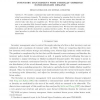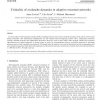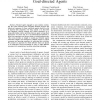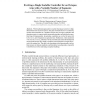380 search results - page 63 / 76 » Models of active learning in group-structured state spaces |
100
click to vote
ICML
1994
IEEE
15 years 3 months ago
1994
IEEE
Compositional Q-Learning (CQ-L) (Singh 1992) is a modular approach to learning to performcomposite tasks made up of several elemental tasks by reinforcement learning. Skills acqui...
ANOR
2010
14 years 12 months ago
2010
Abstract. We consider a continuous-time model for inventory management with Markov modulated non-stationary demands. We introduce active learning by assuming that the state of the ...
IJON
2007
14 years 11 months ago
2007
In many studies of self-organized criticality (SOC), branching processes were used to model the dynamics of the activity of the system during avalanches. This mathematical simpliï...
WOA
2007
15 years 1 months ago
2007
Abstract— Situated agents engaged in open systems continually face with external events requiring adequate services and behavioral responses. In these conditions agents should be...
PPSN
2010
Springer
14 years 10 months ago
2010
Springer
Abstract. While traditional approaches to machine learning are sensitive to highdimensional state and action spaces, this paper demonstrates how an indirectly encoded neurocontroll...




